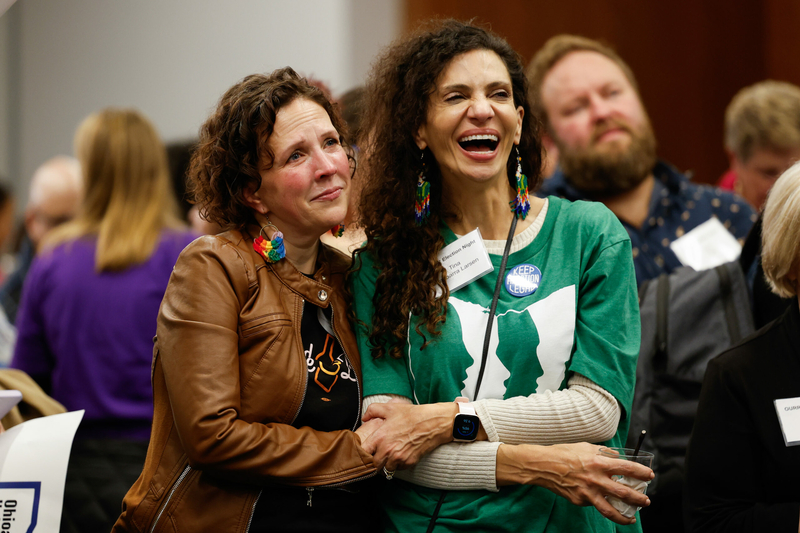State, local elections offer good news for democracy

Attendees react to early election results at an election night party on Nov. 7, 2023 in Columbus, Ohio. The results of this year’s state and local contests, advocates say, could make future elections, including the 2024 presidential contest, freer and fairer. Graham Stokes for Ohio Capital Journal
The big news out of Tuesday’s elections was wins for Democrats and for reproductive rights in Ohio, Virginia, Kentucky and Pennsylvania.
But small “d” democracy also had a good night:
- Virginians elected pro-voting majorities in both chambers, stymieing efforts to pass restrictive new voting laws.
- Ohioans turned out in large numbers to pass two popular ballot measures, showing direct democracy is alive and well despite a concerted campaign in the state to restrict it.
- Pennsylvanians rejected a state Supreme Court candidate who has baselessly stoked fear about voter fraud.
- Two top Kentucky officials who have offered a model of how to work across party lines to expand voter access were both easily reelected.
- And five cities supported a fast-growing democratic reform aimed at producing outcomes that better reflect voter preferences.
The result, advocates say, could be to make future elections, including the 2024 presidential contest, freer and fairer.
“Americans sent a clear message that they reject MAGA extremism and want leaders who will stand up for our fundamental freedoms and our democracy,” said Christina Harvey, executive director of Stand Up America, a progressive pro-democracy group. “Together with last year’s wins in secretary of state races across the country, these victories help build a firewall for democracy in 2024.”
Virginia
Virginia Republicans last year passed bills through the House of Delegates to ban ballot drop-boxes and end same-day voter registration. Had they won control of the Senate Tuesday, those measures could very well have become law — and they could have significantly hampered voter access.
Instead, Democrats held the Senate and even flipped the House, ensuring that anti-voter legislation in the state is dead.
The competitive races for both houses also demonstrated the success of the redistricting reforms approved by the state in December 2021, advocates said, after a Republican gerrymander had been in place for a decade.
“Fair maps are essential to a functioning democracy, and they are critical in this moment to beat back … attempts to roll back voters’ fundamental rights,” former Attorney General Eric Holder, the chairman of the National Democratic Redistricting Committee, said in a statement.
Ohio
Ohio’s results were good news for democracy for a different reason.
Republicans in the state had worked to restrict and complicate Ohio’s ballot initiative process, aiming to make it harder for voters to pass popular measures, including abortion protections. It was part of a national effort to create obstacles to popular democracy.
First, Ohio Republicans put an initiative on the ballot that would have raised the threshold required to pass ballot measures to 60%. Voters overwhelmingly rejected that in August.
Then state officials approved what reproductive rights supporters called misleading and biased language for the abortion measure’s ballot summary, which told voters that the amendment would “always allow an unborn child to be aborted.”
Nonetheless, voters approved the measure, as well as another ballot initiative legalizing marijuana. In doing so, they made clear that Ohio’s process for allowing its citizens to directly pass laws and amend the state constitution — which has often allowed for the passage of popular reforms that lawmakers had kept bottled up — remains viable and robust.
Nearly 4 million voters turned out in an odd-numbered year — nearly as many as in last year’s midterms, when governor and U.S. Senate races were on the ballot.
Ohio’s legislative leaders have limited power to weaken or undo the abortion rights measure because it’s a constitutional amendment. Still, they said they were willing to go against the will of voters to try.
“The legislature has multiple paths that we will explore to continue to protect innocent life,” said House Speaker Jason Stephens.
Despite the high turnout, voter advocates said there were a few signs of problems caused by a new voting law that stiffened ID requirements and put new restrictions on mail voting.
They said poll monitors at Ohio State University in Columbus reported many students saying they hadn’t received their mail ballot in time, and were forced to vote provisionally. And, advocates said, many voters, especially students, didn’t know that their ballots needed to be physically postmarked — not just dropped in a mailbox — by the day before Election Day.
Pennsylvania
Meanwhile, Pennsylvanians helped boost the prospects for future fair elections. They elected Democrat Daniel McCaffery to the state Supreme Court, rejecting Republican Carolyn Carluccio.
On the campaign trail earlier this year, Carluccio stoked unfounded fears about widespread fraud.
“We should be able to go to the polls and understand that our vote counts and understand that there’s not going to be some hanky-panky going on in the back,” she said.
Carluccio also said she would “welcome” a challenge to a Pennsylvania law that expanded mail voting, adding that the measure has been “very bad for our commonwealth.”
Ahead of the 2022 midterms, Pennsylvania’s Supreme Court ruled that mail ballots with missing or incorrect dates could be rejected. Carluccio’s defeat, which gives Democrats a 5-2 majority on the court, makes it less likely that it will issue similar anti-voter rulings next year, in what’s likely to be a pivotal state.
McCaffery has said he supports efforts to increase participation, and that he backs a 2018 Supreme Court decision striking down the state’s gerrymander.
Kentucky
In Kentucky, Gov. Andy Beshear and Secretary of State Michael Adams were both easily reelected. Beshear, a Democrat, and Adams, a Republican, worked closely together in 2020 to ensure an accessible election in the face of the pandemic.
Then this year, they teamed up to convince the GOP-controlled legislature to make some of those changes permanent, creating early-voting centers and expanding the period for mail voting.
“I do think it was good overall for public confidence in the election to have a D and an R at the table together working it out, appearing jointly at press conferences, because that meant that it was unlikely that one side would claim the other side was gonna rig the rules,” Adams said recently. “The Democrats saw the governor, and the Republicans saw me. And so, both sides thought, ‘Well, this must be fair because my guy’s at the table, right?’”
Local elections
Finally, a democratic reform that backers say leads to fairer elections also fared well. Voters in three Michigan cities — Kalamazoo, East Lansing, and Royal Oak — approved the use of ranked choice voting for their elections. Meanwhile, Minnetonka, Minnesota, voted to keep RCV, while Easthampton, Massachusetts, voted to expand it.
RCV, which has been adopted by Maine, Alaska, and Nevada, as well as numerous local governments, allows voters to rank candidates, ensuring that the winner better represents voter preferences.
“American voters are dissatisfied with our politics, and in 27 city ballot measures in a row, they’ve said yes to better choices, better campaigns, and better representation,” Deb Otis, director of research and policy at FairVote, which advocates for RCV, said in a statement. “Everywhere it’s used, voters like and understand RCV, taking advantage of the opportunity to vote honestly and express more choices.”
Mississippi
It wasn’t all good news for democracy.
In Mississippi, Gov. Tate Reeves, a Republican, was reelected despite a strong challenge from Democrat Brandon Pressley. Reeves signed a law this year — later blocked by a court — that banned third parties from collecting mail ballots, making it harder to vote for some seniors and people with disabilities, according to voter advocates.
Another law signed by Reeves makes it easier to remove people from the voter rolls, making it more likely that eligible voters could be purged.
Mississippi Secretary of State Michael Watson also was returned to office. Watson successfully fought efforts to have the state’s ban on voting for people with certain convictions overturned. In 2021, Watson criticized the Biden administration’s efforts to promote voter registration, saying they will encourage “woke college and university students” to cast a ballot.
“You’ve got an uninformed citizen who may not be prepared and ready to vote,” Watson said.
GET THE MORNING HEADLINES DELIVERED TO YOUR INBOX
The post State, local elections offer good news for democracy appeared first on Georgia Recorder.




